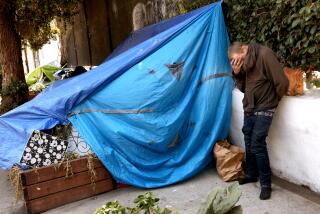Man killed in Venice police shooting was a ‘loving soul,’ friends say
Friends described Brendon K. Glenn as a “traveler,” part of an urban tribe of homeless young adults and teenagers that roams the country, forming shifting alliances or “families” to survive in the streets.
The 29-year-old was “spanging” — the street term for asking people for spare change — outside a Venice bar with his dog Dozer on Tuesday night, friends said, when someone complained that he was harassing customers.
Glenn scuffled with a bouncer and two police officers, one of whom shot and killed him.
The shooting has set off protests in Venice and questions about whether the officers used excessive force. Los Angeles Police Chief Charlie Beck said last week that he was “very concerned” about the shooting after reviewing a security video of the altercation.
The tape has not been publicly released. But Beck was blunt in his view: “Any time an unarmed person is shot by a Los Angeles police officer, it takes extraordinary circumstances to justify that. I have not seen those extraordinary circumstances.”
Glenn’s death was the second fatal shooting by the Los Angeles Police Department of an unarmed, homeless black man in just over two months. The earlier incident, on skid row, received international attention after cellphone video of the confrontation was posted on Facebook.
Both incidents have another thing in common: They occurred in communities with established homeless populations, where tensions caused by rapid gentrification are growing.
In Venice, some residents have fought unsuccessfully to restrict transients from sleeping in their RVs and cars, and City Councilman Mike Bonin sought an ordinance to make it easier to clean up homeless encampments.
But unlike some chronically homeless people on skid row, Glenn was actively working his way out of homelessness, advocates said. He regularly sought services at three Venice homeless agencies, including the Teen Project’s drop-in center.
“Brendon had been coming to the [center] every day for the past month to receive services, and we were working diligently on helping Brendon secure a job,” manager Tim Pardue wrote on the group’s Facebook page after a street vigil Thursday night.
Glenn had traveled around the country, Pardue said, before arriving in Venice a month ago, according to friends. He lived near the boardwalk with a dozen homeless young people who called themselves “family” and “homies.”
They spent their days partying or resting on the beach or skateboarding in the skate park. His signature move was a handstand on the board, said friend Chris Seldon, a Detroit native.
Friends who knew him by the street name “Dizzle” described Glenn as peace-loving and generous, but said he had a drinking problem that sometimes made him belligerent.
“He was a drinker,” said acquaintance Allison Holden, 23, who is also homeless. “But we all have problems.”
Another friend, Caitie Fernandez, said that although many on the streets seem hardened, Glenn was genuinely struggling to survive. She said he battled inner demons but was also a “loving soul.”
“He’d give you anything you needed,” she said.
Seldon, 26, another member of the homeless band, said they came together not just for friendship but for protection. LAPD Officer Peggy Thusing said some travelers are hooked on methamphetamine and bath salts and have been involved in beatings, stabbings and other violence.
“Even some of the regular, true homeless individuals in Venice have been victims,” she said.
“If you want to use their benches or sleep on their turf it can turn very violent,” said Clabe Hartley, a longtime Venice cafe owner who had the tip of his finger bitten off during a run-in at his business in March.
When Glenn’s dog tangled with another, the owner ended up hitting Glenn with the back of his hand, Seldon said.
“He was like, ‘What are you doing that for? I’m loving you, bro, I’m just another skater,’” Seldon recalled.
Holden, who camped with Glenn, said “home bums” tried to run them off a grassy hill near the Venice boardwalk the day Glenn was shot. He stood his ground.
“They said if we didn’t move out they’d cut things up,” said another friend, who gave his street name, Matty Flip.
The day before he died, Glenn called his mother crying, saying he missed her, friends said. Ann McGuirk, Glenn’s grandmother, said he had a 3-year-old son who lives with his mother.
The family encouraged Glenn to travel while he was young, McGuirk said in a phone interview, adding, “He had his whole life ahead of him.”
Capt. Daniel DeWolf of the Troy Police Department in New York state confirmed that Glenn had a history of arrests on suspicion of driving offenses, criminal possession of marijuana, larceny and assault. He had also been charged with resisting arrest and criminal contempt for violating a court order. DeWolf said he did not know what sentences Glenn received.
In Troy, Glenn had worked part time for the city before leaving for the West, according to his grandmother. He stopped in Sacramento and San Diego before arriving in Los Angeles.
Ali Abdul-Matin, who knew Glenn in Troy, said “growing up he was never a fighter... He was a good kid from a good family. That is why it was such a shock to most in Troy.”
A gofundme.com campaign to send Glenn’s body back to New York for burial was launched Friday.
E. Stewart Jones, an attorney for Glenn’s family in New York state, told The Times that Glenn was “unarmed, defenseless and helpless when police shot him” and that he is preparing a lawsuit against the Los Angeles Police Department.
On Saturday night, several dozen people held a memorial vigil for Glenn near where he was killed. Amid a cluster of candles, stuffed animals and flowers, attendees spoke of his kindness as well as his love of skateboarding and his dog.
For friends, Glenn’s death also spoke to the changing homeless scene in Venice.
“There’s always been travelers,” Seldon said. “But how he died, penniless in the streets of Venice, it’s just so damn tragic.”
Twitter: @geholland
Twitter: @lacrimes
Time staff writer Kate Linthicum contributed to this report.
More to Read
Sign up for Essential California
The most important California stories and recommendations in your inbox every morning.
You may occasionally receive promotional content from the Los Angeles Times.












